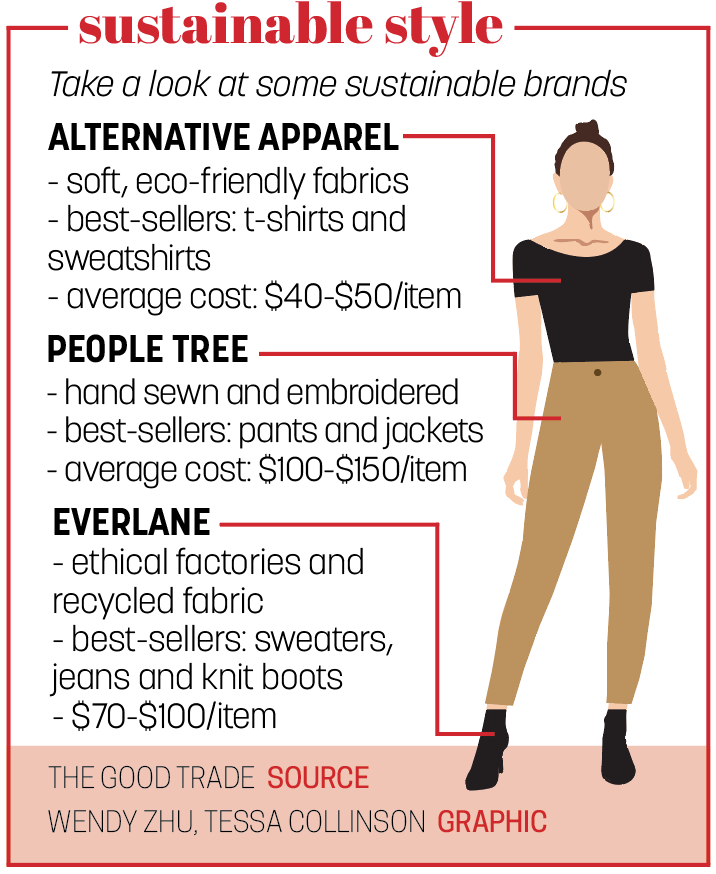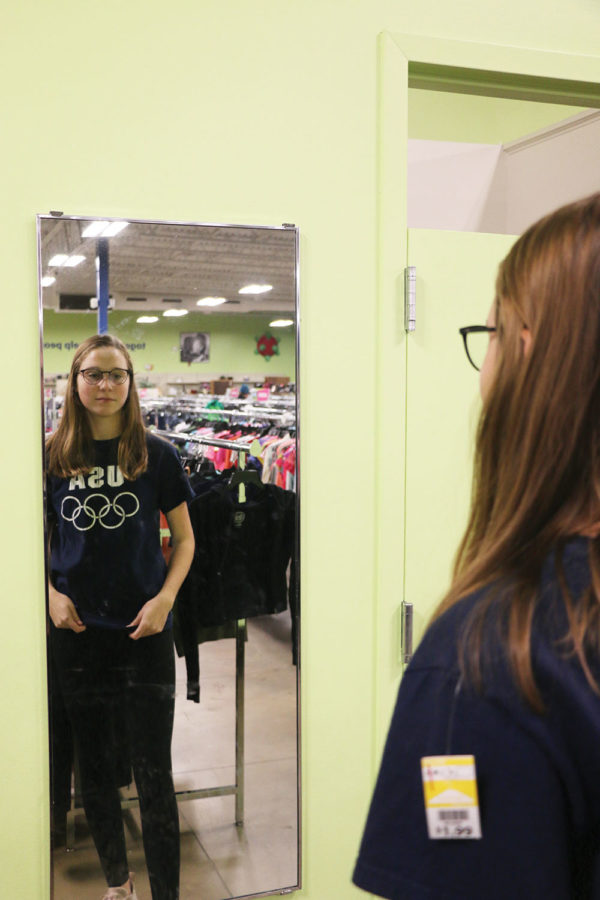Decades ago, clothing stores like Forever 21 embodied the American dream. The franchise brought in billions of dollars worth of revenue, trendy clothing and affordable styles. However, just last month, Forever 21 announced it was filing for bankruptcy and would be closing over 200 stores across the nation. The reason is that Forever 21 operates on a fast fashion model, which means they produce clothing that’s harmful to the environment, to laborers and even consumers. With the world becoming more aware of issues like the environment and good working conditions, customers began to step out of the store and look for more sustainable options.
Junior Jadyn Burkley said she believes fast fashion stores like Forever 21 have several consequences, and it would benefit people in the long run to shift towards sustainable clothing.
“Fast fashion also a lot of the time uses sweatshops and unfavorable working conditions, but on top of that, it hurts the environment,” Burkley said. “Most fast fashion stores have poorer quality or trendier clothing that doesn’t last for a long time, so a lot of their clothing goes to waste.”
And Burkley is right—according to Forbes Magazine, second to oil, the clothing and textile industry is the largest polluter in the world.

Burkley said she doesn’t think stopping fast fashion altogether will be easy since fast fashion stores exist all over the world. However, she said solving this issue is still possible and something that needs to be done.
“I think we should start to decrease our reliance on fast fashion and increase the amount of businesses and companies that operate under a more sustainable standard. In this generation, ultimately we may be able to put a stop to this industry.”
Business teacher Robert Browning said it’s easy for companies to argue that fast fashion is still ethical because clothing is cheap and accessible to a large number of people.
Browning said, “I can understand a company’s argument when they say, ‘Look some people out there—the target market—will purchase this type of clothing and we’re just filling a need.’ Until that need dries up, the free market is going to work in a way where people are going to come in and purchase cheaper, faster clothing.”
However, Browning said he believes the fast fashion business model is slowly drying up with people becoming more environmentally conscious and aware of these issues.
“I think that market for cheap fashion is becoming smaller and smaller in large part because of the awareness people have about the environment and the long term effects (of fast fashion). (Fast fashion)doesn’t just affect one person but everyone from consumers, to workers, to the next generation. I think (businesses) absolutely should be more sustainable and I think they are deciding they are going to be. There’s a large number of businesses whose consumers are demanding that they change to be more sustainable, and in turn, these businesses are already making those changes.”

SHIRT SORTING:
Junior Grace Barney rummages through shirts at Goodwill. Barney said second hand clothes are a more sustainable alternative to typical fast fashion stores.
Junior Grace Barney said sustainable clothing stores and brands don’t always have to be expensive, and that a better form of clothes shopping is thrifting.
Barney said, “I like shopping sustainably. For example, I like going to Goodwill and Salvation Army that carry secondhand clothing that’s still in really good condition. I think (sustainable clothing) is really great, and if you go thrifting, sometimes cheaper and better quality. It’s really nice because there’s such a variety of clothing and even pieces that you can’t find in other stores conventionally.”

Both Burkley and Barney said they no longer shop at Forever 21 and have resorted to more sustainable forms of shopping like thrifting and upcycling clothes.
“I think anytime you can use sustainable clothing, it’s what you should do, which is why I don’t shop at stores like Forever 21,” Burkley said. “I find that most of the clothing is poorer quality and random trends that quickly go out of style. Fast fashion stores are just making cheap products to sell as much as possible, and most of the clothing fades away because it’s fads or on trend right at the moment. I like when my clothing has a little bit of meaning and history and is of good quality. The thing with shopping sustainably is that you can find really timeless and unique pieces that stay with you forever.”































![What happened to theater etiquette? [opinion]](https://hilite.org/wp-content/uploads/2025/04/Entertainment-Perspective-Cover-1200x471.jpg)














































![Review: “The Immortal Soul Salvage Yard:” A criminally underrated poetry collection [MUSE]](https://hilite.org/wp-content/uploads/2025/03/71cju6TvqmL._AC_UF10001000_QL80_.jpg)
![Review: "Dog Man" is Unapologetically Chaotic [MUSE]](https://hilite.org/wp-content/uploads/2025/03/dogman-1200x700.jpg)
![Review: "Ne Zha 2": The WeChat family reunion I didn’t know I needed [MUSE]](https://hilite.org/wp-content/uploads/2025/03/unnamed-4.png)
![Review in Print: Maripaz Villar brings a delightfully unique style to the world of WEBTOON [MUSE]](https://hilite.org/wp-content/uploads/2023/12/maripazcover-1200x960.jpg)
![Review: “The Sword of Kaigen” is a masterpiece [MUSE]](https://hilite.org/wp-content/uploads/2023/11/Screenshot-2023-11-26-201051.png)
![Review: Gateron Oil Kings, great linear switches, okay price [MUSE]](https://hilite.org/wp-content/uploads/2023/11/Screenshot-2023-11-26-200553.png)
![Review: “A Haunting in Venice” is a significant improvement from other Agatha Christie adaptations [MUSE]](https://hilite.org/wp-content/uploads/2023/11/e7ee2938a6d422669771bce6d8088521.jpg)
![Review: A Thanksgiving story from elementary school, still just as interesting [MUSE]](https://hilite.org/wp-content/uploads/2023/11/Screenshot-2023-11-26-195514-987x1200.png)
![Review: "When I Fly Towards You", cute, uplifting youth drama [MUSE]](https://hilite.org/wp-content/uploads/2023/09/When-I-Fly-Towards-You-Chinese-drama.png)
![Postcards from Muse: Hawaii Travel Diary [MUSE]](https://hilite.org/wp-content/uploads/2023/09/My-project-1-1200x1200.jpg)
![Review: "Ladybug & Cat Noir: The Movie," departure from original show [MUSE]](https://hilite.org/wp-content/uploads/2023/09/Ladybug__Cat_Noir_-_The_Movie_poster.jpg)
![Review in Print: "Hidden Love" is the cute, uplifting drama everyone needs [MUSE]](https://hilite.org/wp-content/uploads/2023/09/hiddenlovecover-e1693597208225-1030x1200.png)
![Review in Print: "Heartstopper" is the heartwarming queer romance we all need [MUSE]](https://hilite.org/wp-content/uploads/2023/08/museheartstoppercover-1200x654.png)



